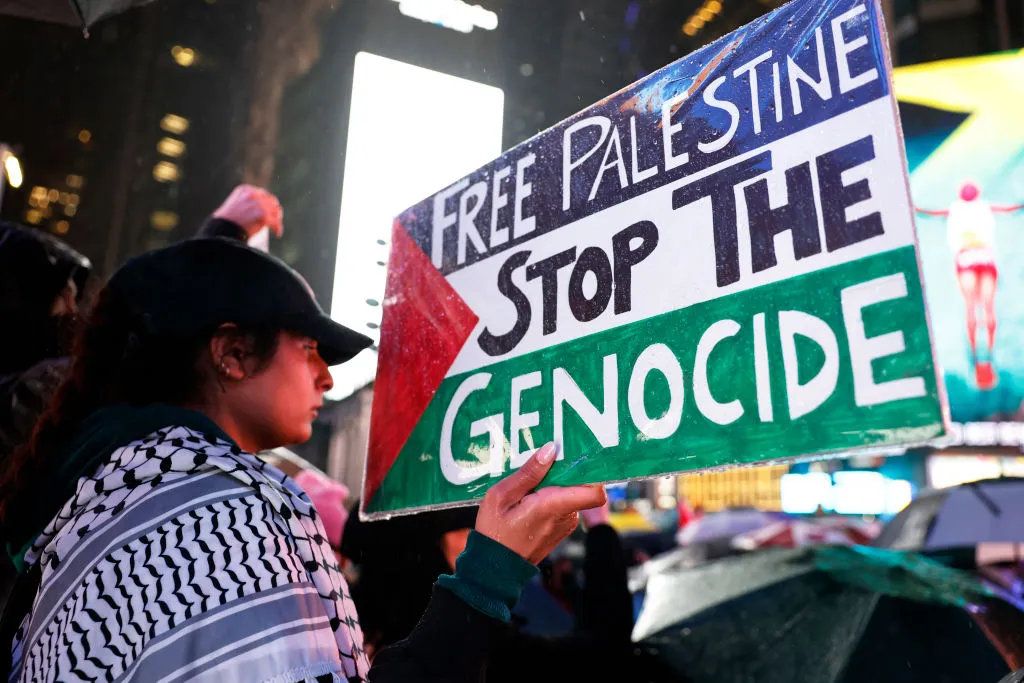NEW YORK, NEW YORK – FEBRUARY 27: A person holds a sign during a vigil for U.S. Airman Aaron Bushnell at the US Army Recruiting Office in Times Square on February 27, 2024 in New York City. (Photo by Michael M. Santiago/Getty Images)
On April 22, PEN America officially announced the cancellation of this year’s PEN America Literary Awards, the annual awards honoring literature’s greatest talents dubbed as “the Oscars for books.” Days later, the organization announced it was canceling the World Voices Festival, another flagship event that was scheduled for May. The reversals come six months since the start of mass protests against PEN America and withdrawals of support by prominent authors, translators, and PEN staff due to its failures to condemn the genocide in Gaza by the Israeli state and to provide necessary support to Palestinian writers, as PEN America has done before with other writers at risk. The cancellation of PEN America’s two banner events over its inadequate response to the violence in Gaza is the latest in a series of controversies plaguing the organization, which include allegations of political censorship lodged by union staff and its failure to compensate incarcerated writers through its annual Prison Writing Contest.
“If your mission is to defend the lives and livelihood of writers and poets all over the world, you cannot pick and choose what country these writers and poets come from,” said Iranian translator Parisa Saranj, who worked with PEN America supporting its Writers at Risk program and its Freedom to Write Award. Saranj was tapped as a judge for PEN’s Translation Prize this year. “I’m not asking PEN to stand up for Palestine and for Gaza. I’m asking them to do their job,” Saranj said of her criticism of PEN America.
As of writing, Israel’s bombing and siege of Gaza has killed over 34,500 Palestinians in justmore than 200 days. High-profile protests against PEN America have grabbed headlines since February, with prolific authors like Roxane Gay, Carmen Maria Machado, and Nana Kwame Adjei-Brenyah signing an open letter criticizing the nonprofit’s weak stance over the Gazan genocide (the letter has gathered more than 1,300 signatories as of March 10). But simmering discontent over the literary institution’s response to the violence enacted by the Israeli government and the U.S. government’s complicity in abetting its military crusade can be traced as far back as October.
Last year, PEN staff sent multiple letters to management in the months following Hamas’ Oct. 7 attack on Israel, which resulted in more than 200 hostages taken by Hamas, and the Israeli military’s subsequent invasion of Gaza. The first letter from staff addressed to PEN America’s leadership criticized its failure to mention Israel’s ongoing occupation of Palestine in a PEN statement after the Oct. 7 attack, as well as its tepid statements on Palestinian civilian deaths and the reported killings of Palestinian journalists. More staffers sent another letter in December that suggested a bias toward Israel in PEN America’s public statements and, most glaringly, its leadership’s refusal to back an official call for a ceasefire by its affiliate PEN International.
In January, the discord turned public. Two prominent novelists pulled out from an event hosted by PEN due to the organization co-sponsoring another event with actor Mayim Bialik, a self-avowed Zionist and fervent supporter of the Israeli military who “has spent the past 100 days sharing dehumanizing anti-Palestinian propaganda,” novelist Angela Flournoy wrote in an email to organizers. “That PEN would seek to give such a person a platform while the Palestinian death toll exceeds 24,000 is unconscionable.” On Jan. 31, Palestinian American writer Randa Jarrar was forcibly removed from the PEN/Bialik event during a staged protest. The incident, recorded and shared on social media, generated more backlash against PEN.
“The truth is that [PEN] were and are unwilling to listen to 1,500 writers who have expressed their disgust with the organization and its leadership. The truth is that they platformed a racist who believes my people should continue to die,” Jarrar wrote in an email to Prism. She ended her statement with a quote from Palestinian writer Ghassan Kanafani: “There can be no dialogue between swords and necks.”
Weeks later, on March 13, dozens of panelists expected to appear at PEN’s World Voices Festival announced they were pulling out in protest of PEN’s neutral statements on the genocide in Gaza. This mass exodus from the festival, known as a pivotal revenue source for PEN, elicited a weighty response from the organization. PEN defended its efforts related to Gaza, referencing dozens of statements on the war the nonprofit had put out and its work assisting Gazan writers in need. Notably, the institution finally called for a ceasefire: “We call, alongside PEN International, for an immediate ceasefire and release of the hostages—an agreement that can pave the way for urgent humanitarian access and lasting peace.”
But the overture was too little, too late. In early April, a dozen authors announced their withdrawals from being honored by the PEN Literary Awards, which represented more than $350,000 in total prize money toward awardees. By April 17, enough writers had dropped out to spell trouble for the awards’ continuance, including half of the nominees for the PEN Translation Prize in addition to nine of the ten nominees for the prestigious PEN/Jean Stein Book Award. Twenty-eight of the 61 authors and translators nominated for a book award this year withdrew their works from consideration.
Dozens who declined their nomination or award published a searing letter to PEN America, calling out its lack of conviction over the unfolding genocide. The writers also demanded the resignations of PEN America CEO Suzanne Nossel and President Jennifer Finney Boylan, both of whom took an official trip to Israel a few months prior, and an audit of PEN America’s “longstanding implicit support of the Israeli occupation.”
For Kelly X. Hui, who declined the PEN/Robert J. Dau Short Story Prize for Emerging Writers for their debut short story “Daughterhouse” and was among the letter’s signatories, their decision was an extension of their organizing work on campus.
“If we are in solidarity with Palestinians, especially when it’s down to careers, livelihoods, that’s the time to sort of take a stand and have it mean even more,” said Hui. As a result of declining the award, Hui will not receive the $2,000 cash prize intended for winners in the debut short story category and their work will not appear in the subsequent Catapult anthology.
Hui said their refusal of the prize was a hard decision made easy when reminded of the voices lost to the brutality in Gaza.
“My refusal of this award is also thinking to the probably thousands of young writers in Palestine who have been killed by the Israeli genocide,” they said.
Amid the protests, PEN’s program director of literary awards quietly stepped down and was replaced by an interim executive, a shift in management that was not disclosed to the judges until March, according to Saranj. In April, Saranj alongside fellow judges Larissa Kyzer, Hanna Leliv, and Jenna Tang, put out a statement supporting the decision of the writers who had declined to accept their nominations or awards from PEN.
“It’s nice to write beautiful flowery poetry and a nice story … But what is the point if you don’t move something in the reader? If you don’t make the reader question his or her assumption about the world that they live in?” said Saranj of the literary community’s engagement with Palestinian liberation.
Asked about the protests against the institution and how PEN might repair its relationship with the community, a spokesperson referred Prism to its statement following the festival dropouts.
On April 26, PEN announced the World Voices Festival would not be moving forward, leaving its May 16 Literary Gala as the last big-ticket event left on PEN’s 2024 agenda. It remains to be seen if the event will go as planned or suffer the same fate as the others before it.
![]()
Natasha Ishak is a New York City-based journalist who covers politics, public policy, and social justice issues. Her work has been published by VICE, Fortune, Mic, The Nation, and Harvard’s Nieman Lab among other places. Follow her on Twitter @npishak.














